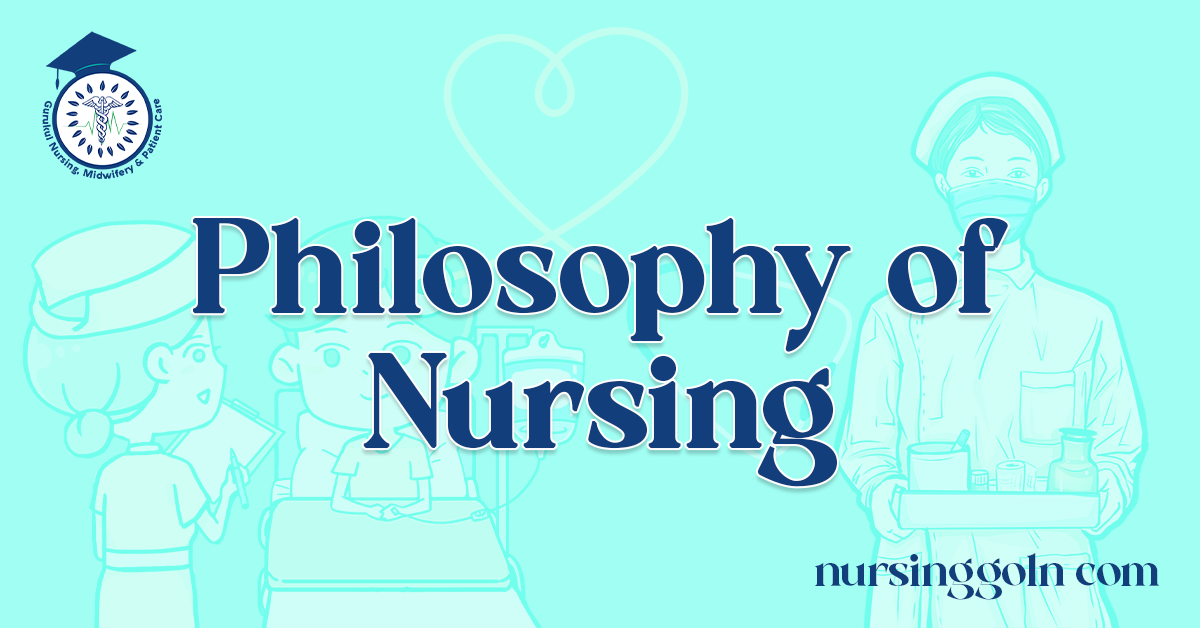Today is our topic of discussion is Philosophy of Nursing. The philosophy of nursing provides a framework for understanding the mission and practices of nursing within broader contexts. Nurses are not just providers of medical care; they are also caregivers, educators, advocates, counselors, and more. They function within a matrix of intricate personal interactions, societal beliefs, and medical practices. A philosophy of nursing, therefore, articulates the values, beliefs, and theories that drive the profession, influencing how nurses approach patient care, interact with colleagues, and understand their role in the larger healthcare system.
Philosophy of Nursing

Historical Context:
Before delving deep into the philosophy of nursing, it’s essential to understand its historical context. The profession has its roots in ancient civilizations, where caregivers, mostly women, provided care based on traditions, spiritual beliefs, and empirical observations. Fast forward to the 19th century, and we witness Florence Nightingale, the foundational philosopher of modern nursing, emphasizing cleanliness, organization, and compassionate care. Her ideas transformed hospitals from places of dying to centers of healing.
Throughout the 20th and 21st centuries, as medicine became more complex, so did the role of nurses. They became integral to healthcare delivery, acting as the bridge between doctors and patients, ensuring that care is holistic and patient-centered.
The philosophy of the nursing profession is defined by four basic concepts:
Person, environment, health and nursing. These four concepts encompass the key tenets of nursing philosophy and practice and define the means by which individuals should be viewed and treated within the nursing profession. The four concepts are interrelated and each is built upon the foundation of the concept that improve. precedes it.
Person:
In nursing theory, human beings are considered in terms of their physiological, psychological, social, spiritual and cultural selves. People are evaluated in terms of their individual place in society as well as their relationships to their family, community and society as a whole.
Additionally, human beings are viewed in terms of their individual needs and how nursing practice is applied to meet these needs. The purpose of nursing and nursing theory is to identify how a particular individuals needs are either met or not met, to predict future needs and to prioritize those needs in order of importance.
Environment:
The environment concept of nursing comprises all the internal and external factors that act on human beings and affect their behavior and development. This includes psychological, spiritual, social, physical and cultural forces as well as the environment in which nursing care is provided.
The idea behind this concept is that the environment influences individual and collective health and that individuals who experience a positive, comfortable nursing environment are more likely to demonstrate good health versus those who receive a level of care that is lacking.
Health:
The concept of health refers to an individual’s physical, mental and social well-being and at what point they are on the health spectrum, which ranges from good health to poor health or death. Health is considered to be affected by genetic factors, environmental factors.
lifestyle factors and external mechanisms such as bacteria. a person’s place on the health spectrum is constantly changing and in a nursing context, it is the responsibility of nursing professionals to identify the patient’s place on the spectrum and to take steps to help that person’s health
Nursing:
Nursing refers to the process of caring for the health of human beings and assisting individuals in meeting their needs while also teaching them the basics of caring for themselves. The responsibilities of the nursing profession are to promote good health, to prevent disease when possible, to promote healing in those who are ill and to ease the suffering of dying patients.

The concept of nursing extends beyond the health care facility to the community, and society as a whole, and views individual health and the environment as closely related. Nursing is defined as care that is tailored to the needs of individuals and that is provided in an efficient and effective manner.

Core Values and Beliefs
A philosophy of nursing is anchored in a set of core values and beliefs:
- Holistic Care: Nurses believe in treating the whole person, not just the disease. This encompasses physical, emotional, psychological, spiritual, and social needs.
- Inherent Dignity: Every individual, regardless of their health condition, age, race, gender, or socioeconomic status, deserves respect and dignity.
- Empathy and Compassion: A foundational belief in nursing is the importance of empathy and compassion in care. Nurses often serve as the emotional pillar for patients and their families.
- Interdisciplinary Collaboration: Nurses work closely with doctors, therapists, social workers, and other healthcare professionals. They understand that effective care requires collaboration.
- Advocacy: Nurses are patient advocates, often acting as their voice, especially when patients are vulnerable or unable to speak for themselves.
- Continuous Learning: The medical field is ever-evolving. Nurses believe in continuous learning to ensure that they provide the best care possible.

Theories in Nursing Philosophy
Several theories define the philosophy of nursing, providing models and frameworks for nurses to implement and interpret their care:
- Virginia Henderson’s Need Theory: Henderson defined nursing in terms of assisting individuals to perform activities contributing to health or its recovery that they would perform unaided if they had the necessary strength or will.
- Jean Watson’s Theory of Human Caring: Watson’s theory emphasizes the humanistic aspects of nursing in relation to health, illness, and the experience of illness. It focuses on caring as the core of nursing and the nurturing of mind, body, and spirit.
- Patricia Benner’s Novice to Expert Theory: Benner posited that nurses move through five stages of career development, from novice to expert. Her theory emphasizes the importance of experiential learning in nursing.

Current Issues and The Philosophy of Nursing
Today, the field of nursing faces numerous challenges, from healthcare reforms and the rise of technology to issues like burnout, staff shortages, and the global health crises like the COVID-19 pandemic. The philosophy of nursing provides a beacon of guidance amidst these challenges:
- Ethical Considerations: The philosophy of nursing, with its emphasis on dignity and holistic care, guides nurses when faced with ethical dilemmas, such as end-of-life decisions or resource allocation.
- Technology and Human Touch: While technology has revolutionized healthcare, the philosophy of nursing reminds professionals that the human touch, empathy, and compassion remain irreplaceable.
- Burnout and Self-Care: The philosophy underscores the importance of self-care. Nurses cannot care for others if they are burnt out or emotionally exhausted.

The Future of Nursing and Its Philosophy
As healthcare continues to evolve, so will the philosophy of nursing. Topics such as genetic engineering, artificial intelligence in healthcare, and global health disparities will increasingly become part of the nursing discourse. The philosophy of nursing will need to expand and adapt, providing ethical, moral, and practical guidance in these new frontiers.
However, certain core tenets will remain unchanged. The belief in holistic care, the importance of empathy and compassion, and the commitment to patient advocacy will always be central to the philosophy of nursing.

The philosophy of nursing is more than an academic discourse. It’s a living, evolving guide that informs the daily actions, decisions, and interactions of nurses worldwide. It roots the profession in a set of unshakable values and beliefs, ensuring that regardless of the challenges and changes in healthcare, nurses will always strive to provide the best, most compassionate care possible.
From ancient caregivers to modern healthcare professionals armed with the latest in medical technology, the essence of nursing remains the same – a commitment to the well-being and dignity of all individuals. The philosophy of nursing, both in its historical roots and its forward-looking perspectives, serves as a testament to this noble profession’s enduring heart and soul.
